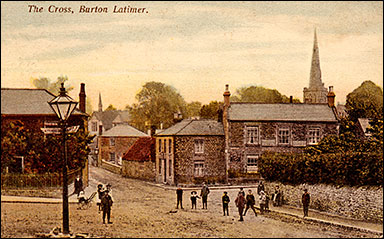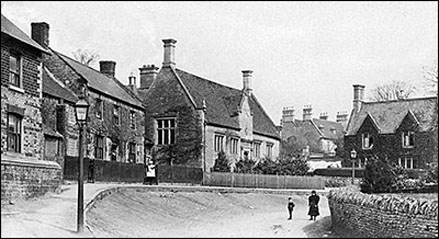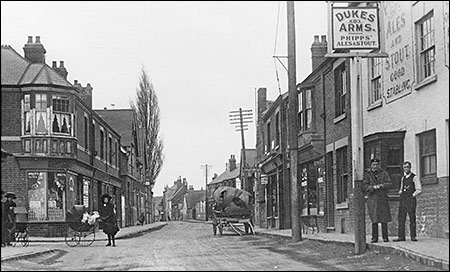|
From the Northampton Mercury account of proceedings at Kettering Magistrates Court 12 May 1877.
Charge of Assault against a Police-constable - P.C. Wright of Burton Latimer, was charged with assaulting George Willis, at Burton Latimer on 20th April.
Mr. Walker of Wellingborough for the complainant; Mr. W.J. Henry, of Wellingborough, for the defendant.
Mr. Walker, in opening the case, said the summons was taken out for a common assault, but he thought he should be able to show that something more than a common assault had been committed, and he should ask the magistrates to send the case for trial at the Sessions.
George Willis, ironstone worker, of Cranford, said he was at a public house, with Stephen Toseland, at Burton Latimer, on the night in question, and in getting up to light his pipe knocked George Fox's hat off. Fox then said if he was not so big he would give him "a good hammering." The defendant (PC Wright) came in, and, using an oath, said he would have no row with those Cranford chaps. He then left, and shortly afterwards, in company with Stephen Toseland, prosecutor (Willis), also left the public-house, and after walking about 200 yards he met the constable who said, using an oath "Now, get off." He then caught hold of prosecutor's collar and almost pulled him down to the ground. He also pushed him some distance in the direction of the school-house. When they got behind the school-house prosecutor said he would go home without pushing. Defendant then drew his staff and struck him twice on the head; he also kicked him in the ribs, and then hit him twice on the head again, upon which witness became insensible. Dr. Price had attended him. When he was at the public-house defendant came in and said witness had torn his coat. He was perfectly sober. The policeman had had more drink than he had.
By Mr. Henry: the landlord had told him to leave the house, but he was not drunk. He did not refuse to leave the house and never squared his fists. He did push against the constable as he left the public-house. There was no struggle between them at all, and he never struck the constable. The police-man followed him to his house at Cranford. -- Stephen Toseland, labourer, of Grafton, said on the day in question he was at Newman's public-house with the complainant, when some words took place between Willis and Fox. The landlord told Willis he had better leave, which he did. As they left the public-house they saw the policeman, who came up and said "Now shift or I'll make you." He then got hold of the complainant's collar and "swittered" him into the road. Willis was perfectly sober, and the policeman was "rash tempered".
By Mr. Henry: He did not see Willis drink anything in the public-house, Willis did not offer to fight tand did not square his fists. The policeman asked willis to be quiet. Complainant did not offer to fight the constable. when the landlord asked Willis to leave, he said he would go in a few minutes. Elizabeth Croxen said she was in the street at Burton Latimer on the night in question, and saw tow men standing against the pump. A policeman was about ten yards off the men. and shortly afterwards he came up and collared one of the men and pushed him away right up the road. One of the men, who she recognised as Willis, said several times "Stop, Mr. Wright; hear what I have got to say." She knew Willis's voice and could not be mistaken. -- By Mr. Henry: Willis was quite a stranger to her; she had not seen him before that night. -- Charles Mason, groom, of Cranford, said George Willis lodged with him. On the night of 20th April Willis came home about half-past nine. He was very much covered with blood, which came from wounds on the head. Witness washed his head and found there were two wounds on the left side, one on the forehead, and another on the left side. While he was washing the complainant's head P.C. Wright and P.C. Blackman came in and the defendant complained of what the complainant had done, and showed him a coat which had been torn. He could not understand whether it was a policeman's coat. It had not bright buttons on. He called Dr. Price, and Willis remained in bed the better part of the next day. Dr. Price said he was called on on the 29th of April to attend the man Willis, who was suffering from four wounds on the head. They were not clean cuts, and were such as might have caused by a blunt instrument. His arm, head and body were bruised. The wounds had been bleeding very much. By the position of the wounds he thought it would be practically impossible for them to have been caused by a fall. The man might have have been excited by drink. George Spokes, shoehand, of Burton Latimer corroborated the woman Croxen, and said he followed the defendant and the men, and heard blows being struck. He afterwards saw the policeman running after complainant, hitting him sharp blows. By Mr. Henry: He stood and lok=oked on. He had not liked to interfere.with a policeman when he was doing his duty. By Mr. Henry: There was a crowd of boys and girls following the complainant. Frederic Clipstone, labourer, of Burton Latimer, said on the 20th of April he went to Newman's public house, when a policeman came in and insisted upon Willis leaving. The constable said "If you don't leave the house I will wait on you before you go home," and he put the "b" in with it. (Laughter) By Mr. Henry: He never heard anything said by Willis about fighting. When the policeman asked Willis to leave he did not offer to fight. After that the landlord came in and asked Willis civilly to leave the house. He never refused to leave. Willis was not drunk but had had a "drop of drink." He did not know of any reason why the complainant was asked to leave the house.
Mr. Henry here addressed the Bench for the defence, and called Alfred Newman, publican, of Burton Latimer, who said on the 20th of April Willis was in his house, and in consequence of something that was said by P.C. Wright, he went into the tap room, and found the compainant in an ixcited state. He requested him to leave. He appeared excited about something that had occurred in the house. He refused to leave, and he repeated his request two or three times. He then went to fetch the constable to remove him, and when he returned Willis was gone. -- By Mr. Walker: There was a lot of talking of fighting. Compainant had nothing to drink in his house. His opinion was that compainant was either drunk or very excited. He would swear that he asked the compainant to leave three times. He wa a stranger in the neighbourhood, and did not want any unpleasantness. Whenhe asked compainant to leave he said, "I shan't."
William Robinson said, on Friday, April 20th, he went to Newman's public-house, and saw "Whitehead," as they called Willis, there. There was something said about a hat being knocked off. There was a confusion amongst them, and complainant said he would fight any of them. There was a man named Sargeant, who said he would have a round or two with him if he would go out. A policeman came in, and told Willis to be quiet, or to go out. Complainant then put himself in a fighting attitude. There was a great deal of noise and confusion. The landlord asked Willis to leave the place three or four times. Willis was very excited and noisey. -- Stephen Blake, blacksmith, of Burton Latimer, said, on the evening of the 20th of April he was outside Newman's public-house talking to the constable when two men came out, and one of them ran against the policeman, who was standing in the middle of the road. He was about ten yards off the corner. The policeman gave the man a shove, and told him to stand off. The man then squared his fists, but didd not offer to strike the constable. The men then went up the street, and the policeman followed them. He had been told if he came to give evidence some work would be taken away from him. -- P.C. Blackman, stationed at Cranford, said, on Friday the 20th of April, defendant came to him, and they together went to Willis's lodgings at Cranford. He went into a back room, where the complainant was, and he appeared to be the worse for drink.Wright made a charge against Willis of assaulting him, and then Willis accused him of striking him. He saw Wright's coat, which was rent from the collar down to the belt. -- This concluded the first case.
There was a cross-summons, charging George Willis with assaulting P.C. Wright, while in the execution of his duty, on the 20th of April. -- P.C. Wright said, on Friday, the 20th of April, he was on duty, at Burton Latimer, and, hearing a noise at Newman's public-house, went into the tap-room, and found the defendant drunk and wanting to fight George Fox, shoemaker, of Burton. witness requested him to leave the house, upon which defendant turned up his coat and offered to fight. He left him and went to the landlord, and told him that he ought to turn him out. He then went into the street. The landlord shortly afterwards came to him and asked him to go and turn the man out. He did not do so, but told the landlord to go and tell him to leave again. He was speaking with Blake, when two men came out of the side gate of the public-house, and one of them (Willis) ran against him with his shoulder. He pushed him with his hand, and said, "stand off." Willis then put his hands in a fighting attitude, but dropped them again, and walked away. Complainant followed him about 100 yards, and when near the Post-office Willis wanted Toseland (the other man) to have another pint of beer, and was angry because he would not. There was a crowd of boys and girls around them. Complainant requested Willis to leave the place, and, as he refused, he pushed him towards the school, and when near the school-yard defendant said, "I'll go." He thern left hold of him, and Willis turned round and seized him by the collar. a scuffle ensued, and they fell together. He still kept hold of his collar, and when complainant unbuttoned his coat the tunic tore and gave the defendant room to get up, which he did, and put his foot on complainant's stomach, saying, "I'll crush your inside out." Witness then struck him with his staff either on the head or the arm. Defendant then ran away, and complainant followed him. He caught him and they had another struggle, in which witness got at top. Defendant said, "Don't hit me again: I'll go home." Complainant struck him four or five times. The defendant then rushed at him again, and tore his coat further down, upon which complainant sruck him two or three times, and the defendant then ran towards Cranford. Witness afterwards went, with P.C. Blackman, to Willis's lodgings. He charged Willis with assaulting him and tearing his coat. The coat produced was the one he wore at the time. -- By Mr. Walker: Willis was drunk. He was quite sober. He never kicked the man when he was down. -- Willis was then charged with being drunk and refusing to quit Newman's public-house when requested to do so. Newman's evidence was the same as that given in the first case.
The Magistrates, after retiring, said they had thoroughly considered the three cases, and in the first case, which was that against the constable for assault, they had decided to didmiss the summons, because they were of opinion that Wright was only doing his duty in ordereing Willis out of the house, and that Willis was the aggressor, being the first to cause the disturbance. In the second case they had decided to fine Willis, but only in a small penalty, in consequence of Wright having used more violence than was necessary; at the same time he was perfectly justified in using the staff. He would be fined 5s. and costs, in all £1 10s.
The third case was dismissed.
 |
 |
|
Stephen Blake, who was threatened with loss of trade
if he testified, lived in the house in the centre of this
picture attached to his red-roofed blacksmith's shop
|
The Post-office, referred to by P.C.Wright, was in the building
set behind the wall on the left of this picture. The schoolhouse
is the tall-chimneyed building in the centre
|
|


